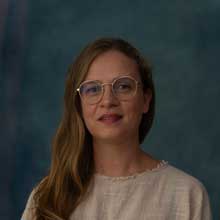Let’s talk about you: what is your background, what do you teach, and what are your research interests?
Sara Culeddu, I come from the province of Rome (Civitavecchia) and trained at the universities of Florence, Trento and Oslo. I have worked in Florence, Milan, and Rome and mainly deal with the relationship between humans and animals in contemporary Scandinavian literature, and Scandinavian literature in Italian translation.
Tell us about your academic path.
After completing a bachelor’s degree in Florence, a postgraduate degree in Oslo, and a doctorate in Trento, at the age of 30 I began contract teaching in Milan, translating for publishing houses and getting my first research grants. At 39 I joined Ca' Foscari as a researcher and today I am an associate professor in Scandinavian Languages and Literature.
What are your professional role models / references?
This one is easy because, among the many inspiring people I have met, I am fortunate to have found a true master: Fulvio Ferrari.
Have you always known that this was going to be your path?
I've never thought about my path, however, I’ve always followed this one.
What is the aspect of your research you are most passionate about?
I love the increasingly collaborative and less solitary practice of research, i.e., meeting and exchanging ideas with Italian and foreign colleagues. I love being able to travel to Scandinavia, following my research in directions I had never gone before. I love the moment when the flicker of an idea comes in a form that is still disordered, but I sense that I must not let it go. I love that my research areas involve aspects that are yet largely unexplored, and the freedom this entails.
What does teaching and researching mean to you?
This question is a difficult one. If studying and conducting research are the continuous pursuit of joy and fulfilment, physically and intellectually, which I embrace before pushing myself beyond it, teaching is the testing of all that I believe I know. In teaching, instinct gives way to method, while knowledge seems to “settle” at the very moment it is shared. That is the hardest transition for me, but I have learned that with teaching comes the joy of sharing!
What has given you the greatest satisfaction in your career?
To date, my greatest professional satisfactions are my first publication — which was able to intercept a current of study (human-animal studies), at the time still unpublished; my role as a translator of Scandinavian literatures in Italian publishing; and finally, working at Ca' Foscari!
What study area have you always wanted to be involved in, but have not yet had the opportunity to explore?
Sami languages and cultures. Sometimes I think it would take another life, but then I make a commitment to myself not to give up.
What would you say to young people starting their university career?
Keep exploring, even if you think you already have clear ideas, and enjoy exploration and unexpected encounters with people and texts. Be humble, because there's (always) a lot to learn. Let yourself be guided and inspired. Exercise the valuable practice of listening. Find the courage to express your doubts and opinions.
What would you say to young researchers?
I would suggest they create broad networks around their research, and focus on collaboration rather than competitiveness. It is much more fruitful and fun. Be ready to sacrifice something, and more importantly, learn when it is not worth it.
Why Ca’ Foscari and Venice?
Ca' Foscari, in the person of Massimiliano Bampi and those who assisted him in his project, had the vision to invest in a new Scandinavian pathway. It’s a bright, new hub full of promise. I get to work with colleagues with whom I have great synergy (Massimiliano Bampi himself, Massimo Ciaravolo, Annette Blomquist) and it is the most dynamic, international, and challenging university I have ever worked at.

